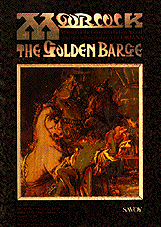| HOME | BOOKS | COMICS | RECORDS | NEWS | PEOPLE | PICTURES | ORDERS | HISTORY | office@savoy.abel.co.uk |
|
|
The Golden Barge Michael Moorcock 1979 b/w illustrated novel 21 mm x 148mm Soft 'Videoback' covers First publication Distributed by New English Library 224 pp ISBN 0 86130 002 5 |
|
 |
 |
Michael Moorcock's first novel, featuring anti-hero Jephraim Tallow and written under the twin influences of Mervyn Peake and Bertolt Brecht. We rescued this from a mouldering storeroom at Tower House,
Mike and Linda's Ingleton home in the late '70s.
The ground-breaking Tayfoil 'laser-light' treatment (in 4-colours) of the Gustave Moreau cover art had not been used on a general paperback jacket in the UK before, and cost as much as the interiors. The technique was used on the sleeve of the single 'All I Want' / 'When I'm Bored' by punk band Snatch (Patti Palladin and Judy Nylon), and we took it. Illustrations by James Cawthorn and an introduction by M John Harrison. Front cover painting: The Apparition, 1876 Back cover painting: Diomedes Devoured By His Horses, 1865 • A few copies of this title are still available. See the Orders page for purchase details. |
|
|
"Moorcock, as we can see, chose to be a human being instead of
a Mervyn Jones, a man instead of a Kingsley Amis, and set about
forging that amused and compassionate anarchism which is the chassis
of the Cornelius tetralogy. The concern which gave birth to Mrs
Cornelius also informs her death; it saw its own birth in The Golden Barge. Moorcock's passionate belief is in humanity and in the individual.
This book is a plea that both should resist the pressure to become
ordinary and institutionalised. It should be read for its Goya-like
horrors and its flashes of mercy; and for its final rejection
of cynicism."
M JOHN HARRISON
"On some timeless morning, Jephraim Tallow—"four feet of widemouthed, red-haired, grinning travesty of the human race"—awakens to find that, although his mouth no longer bleeds, he has lost his navel. And as he ponders this transformation, the river on which he lives spawns a beautiful golden barge, coursing steadily onward, apparently without a crew or motive power. It is then that Tallow realises that "(he) was no longer the integrated and impenetrable thing he had been, for he had not taken the golden barge into account before". So begins The Golden Barge, Michael Moorcock's first novel, completed in 1958 at age 17 and
published only now through the auspices of Savoy Books. The manuscript
was apparently never submitted to a publisher, and has been printed
here with only minor revisions (most evident in the opening chapters).
It is recommended reading for historical curiosity value rather
than for literary or entertainment merits; yet the novel displays
a maturity of thought (if not writing style) sufficient to stand
on its own. The Golden Barge has an allegorical intent more akin to Moorcock's recent work
than his early published efforts in the heroic fantasy field.
To describe it as a Mervyn Peake version of Heart of Darkness would be neither unfair nor unflattering. Jephraim Tallow's story is a quest into the mystery of self, as he leaves his whining, over-protective mother to follow the golden barge down the eternal river, always just out of reach and always leading Tallow into situations of moral ambiguity. It is a journey through landscapes of despair, perhaps even more relevant now than in the 1950s, as Tallow's obsessive pursuit of the barge acts as the catalyst for a wake of emotional and physical destruction—crime, revolution, war, treachery, failures of love, and vindictive rejections of philosophies and ideals. For Jephraim Tallow cannot reconcile his desperate need for individuality with the obligations of humanity; and the golden barge looms ever on the distant horizon. Those so inclined might have a field day of literary detective
work; for example, there is a city named Melibone (sic), a character
called Slorm, and several other, less direct references to later
novels. And, of course, Jephraim Tallow has reappeared (if only
to meet his end) in Gloriana. But as M John Harrison observes in his adroit introduction, the
conclusion of such efforts can only be: "Look here! When he wrote
The Golden Barge, Moorcock was Moorcock!" Savoy is to be congratulated for preserving this charming curiosity
piece, and its packaging, with Gustave Moreau cover reproductions
and James Cawthorn interiors, is superb. Rumour has it, however,
that the gold-leaf Moreau reproductions have rendered the book
irretrievably unprofitable. I hope not; further scheduled books
by Savoy indicate that this publisher is dedicated to preserving
some excellent fantasy rarities." DOUGLAS E WINTER |
|
|
More Moorcock in Savoy:
|
| Main Book Page | Author Index | Book Covers Index | Title Index | Articles | The Revenant Zone | Links |